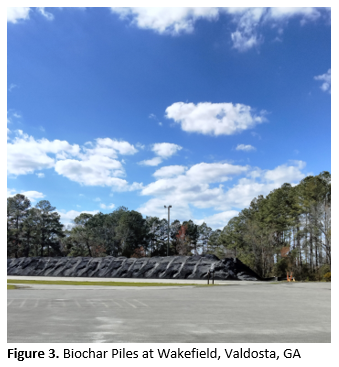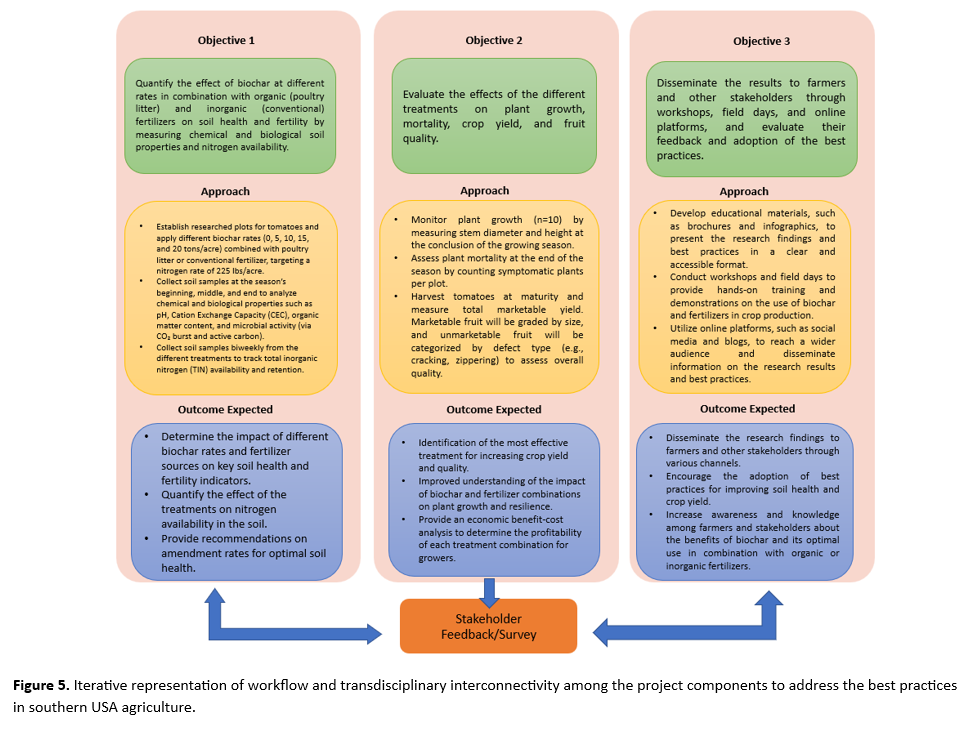Project Overview
Commodities
- Vegetables: tomatoes
Practices
- Animal Production: manure management
- Crop Production: fertilizers
- Soil Management: soil quality/health
Abstract:
This project aims to assess the effectiveness of biochar, a type of charcoal produced through pyrolysis, on soil health and crop productivity in South Georgia. The study will use biochar at different rates (0, 5, 10, 15, and 20 tons/acre) in combination with organic (poultry litter) or inorganic (conventional) fertilizers. The objective is to quantify the effect of these treatments on soil health and yield using standardized monitoring protocols. The study will also analyze the impact on plant growth, including plant height and stem diameter, as well as tomato fruit yield and quality, and the microbial activity of the soil.
By combining biochar with poultry litter, it is hypothesized that biochar will enhance nutrient retention, thereby reducing nutrient runoff. Additionally, the presence of biochar may also reduce the negative environmental impacts associated with poultry litter alone. The project will evaluate the effects of the amendments on soil chemical and biological properties, including pH, organic matter content, microbial activity, nutrient availability and retention in the soil, and potential for toxic metal accumulation.
The project utilizes locally sourced byproducts, including biochar from pine forestry byproducts and poultry litter from Georgia's broiler production. A key component of this project is an economic benefit-cost analysis to determine the profitability of these practices for growers. The findings from this research will be shared with farmers to enhance best practices, improve crop management, and address environmental challenges. The results are expected to contribute to the sustainability of southern agriculture by improving profitability, sustaining ecological quality, and enhancing the quality of life for farmers and rural communities.
Project objectives:
Objective 1
Quantify the effect of biochar at different rates in combination with organic (poultry litter) and inorganic (conventional) fertilizers on soil health and fertility by measuring chemical and biological soil properties and nitrogen availability.
Approach
-
Establish researched plots for tomatoes and apply different biochar rates (0, 5, 10, 15, and 20 tons/acre) combined with poultry litter or conventional fertilizer, targeting a nitrogen rate of 225 lbs/acre.
-
Collect soil samples at the season’s beginning, middle, and end to analyze chemical and biological properties such as pH, Cation Exchange Capacity (CEC), organic matter content, and microbial activity (via CO₂ burst and active carbon).
-
Collect soil samples biweekly from the different treatments to track total inorganic nitrogen (TIN) availability and retention.
Outcome Expected
-
Determine the impact of different biochar rates and fertilizer sources on key soil health and fertility indicators.
-
Quantify the effect of the treatments on nitrogen availability in the soil.
-
Provide recommendations on amendment rates for optimal soil health.
Objective 2
Evaluate the effects of the different treatments on plant growth, mortality, crop yield, and fruit quality.
Approach
- Monitor plant growth (n=10) by measuring stem diameter and height at the conclusion of the growing season.
- Assess plant mortality at the end of the season by counting symptomatic plants per plot.
- Harvest tomatoes at maturity and measure total marketable yield. Marketable fruit will be graded by size, and unmarketable fruit will be categorized by defect type (e.g., cracking, zippering) to assess overall quality.
Outcome Expected
-
Identification of the most effective treatment for increasing crop yield and quality.
-
Improved understanding of the impact of biochar and fertilizer combinations on plant growth and resilience.
-
Provide an economic benefit-cost analysis to determine the profitability of each treatment combination for growers.
Objective 3
Disseminate the results to farmers and other stakeholders through workshops, field days, and online platforms, and evaluate their feedback and adoption of the best practices.
Approach
-
Develop educational materials, such as brochures and infographics, to present the research findings and best practices in a clear and accessible format.
-
Conduct workshops and field days to provide hands-on training and demonstrations on the use of biochar and fertilizers in crop production.
-
Utilize online platforms, such as social media and blogs, to reach a wider audience and disseminate information on the research results and best practices.
Outcome Expected
-
Disseminate the research findings to farmers and other stakeholders through various channels.
-
Encourage the adoption of best practices for improving soil health and crop yield.
-
Increase awareness and knowledge among farmers and stakeholders about the benefits of biochar and its optimal use in combination with organic or inorganic fertilizers.


